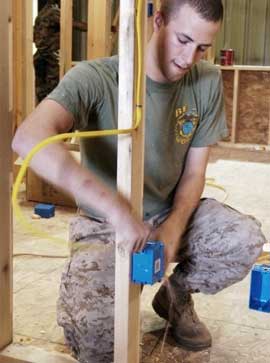Helmets to Hardhats is a national nonprofit that empowers our nation’s service members to succeed once they choose to return to civilian life by connecting them to sustainable apprenticeship training programs and career opportunities in the building and construction industry.
By Leonard Aguilar | Nov. 11, 2018
Our veterans are tough – they can do anything they put their minds to. They are our nation’s bravest men and women – individuals who have dedicated their lives to service.
With that said, transitioning from military to civilian life is an understandably challenging time for many veterans. There are many unknowns: How will this work? What comes next?
In my role as executive director and secretary-treasurer of the Texas State Building and Construction Trades Council, I know what it takes to thrive in the construction industry. I have also seen firsthand how the skills and qualities developed in the military can prove invaluable on a jobsite – from diligence and resilience, to drive and integrity.
As Veterans Day is upon us, I would like to highlight one organization that gets it right: Helmets to Hardhats.
Helmets to Hardhats is a national nonprofit that empowers our nation’s service members to succeed once they choose to return to civilian life by connecting them to sustainable apprenticeship training programs and career opportunities in the building and construction industry.
Yes, returning home can be difficult. However, our focus should shift to making veterans’ homecomings less burdensome – both on themselves and on their families. If veterans are made aware of the opportunities that await them, returning home can become less stressful and more exciting.
The apprenticeship training of North America’s Building Trades Unions (NABTU) is a natural fit for transitioning service members.
When Helmets to Hardhats connects the armed forces community with this training, it can be a perfect match – evidenced by the fact that most individuals who experience successful transitions begin with little to no experience in their chosen field.
Even better, the apprenticeship programs are privately-funded – provided by the trade organizations and their contractors at no cost to American taxpayers.

